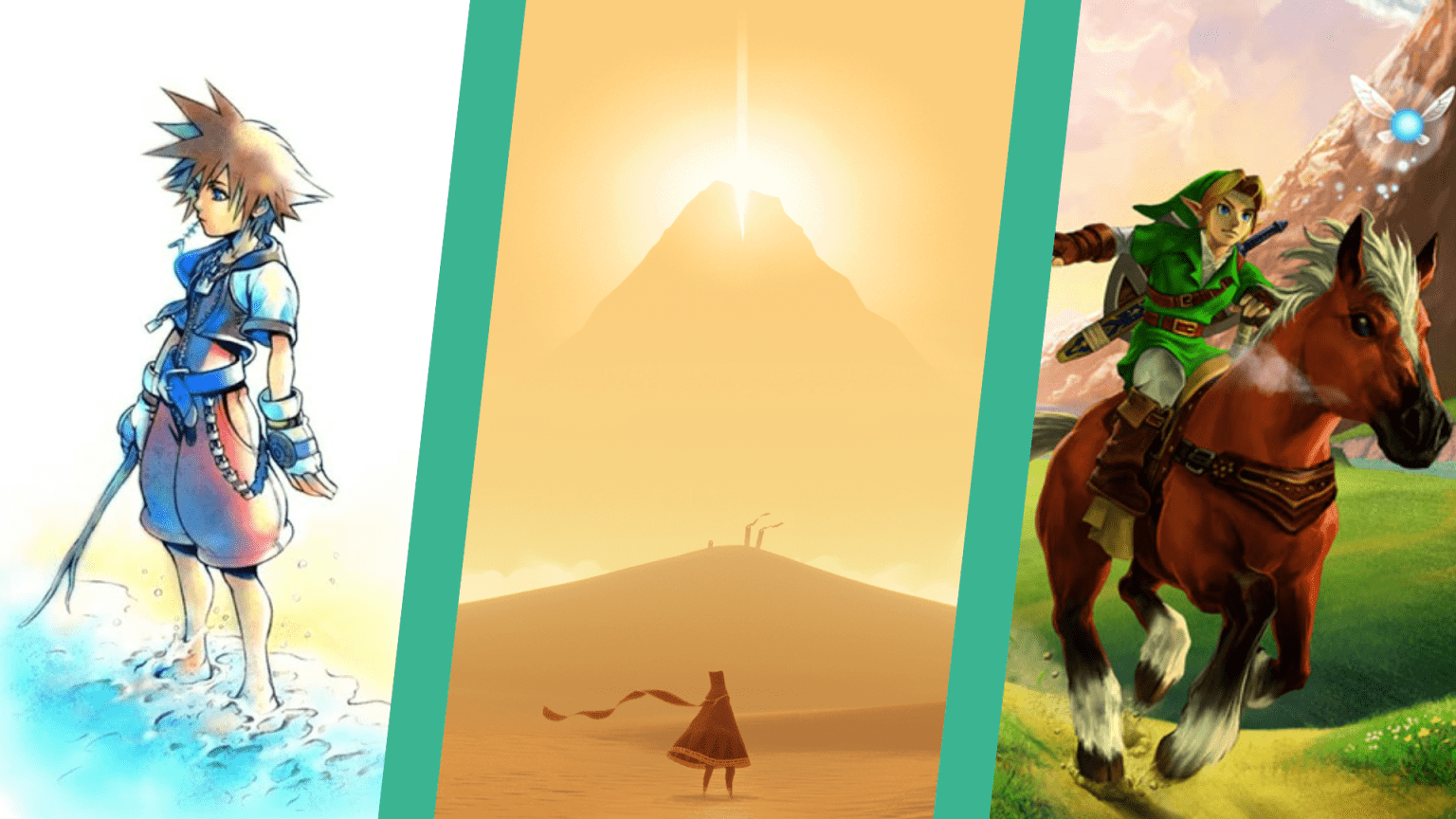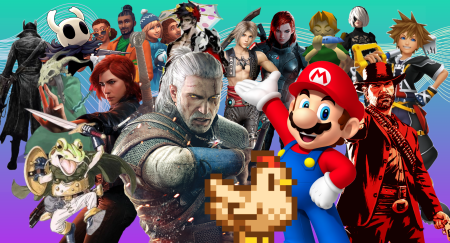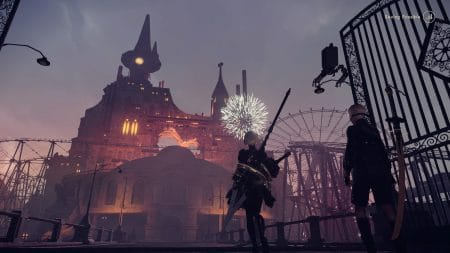Behind every great video game, there’s a great video game soundtrack. Sure, there’s the occasional exception (Limbo, Gone Home, etc.), but those silences are artistic rarities. Nearly every successful game is bolstered by great tunes—ones that hit you in the feels and set the tone for your adventure.
Today, I’m breaking down the best video game songs of all time. From retro chiptunes to modern orchestral numbers, jazzy beats to pulse-pounding synth, there’s something for everyone here.
A few ground rules:
- The following picks are based on a blend of factors—including cultural relevance, artistic merit, and personal preference.
- To ensure a diverse selection, I’ve limited my picks to one song per franchise.
- These songs are all original compositions (i.e., not licensed music).
- Why 11? Simple: I had a hard time narrowing it down to just 10!
The Top 11 Video Game Tracks Ever
Without further ado, let’s get to it. Here are my 11 favorite pieces of video game music:
11. “Dearly Beloved” – Kingdom Hearts
Simple, elegant, and poignant, “Dearly Beloved” is a masterclass in video game artistry. Composed by the legendary Yoko Shimomura (Street Fighter II, Final Fantasy XV), “Dearly Beloved” serves as the recurring title theme of the Kingdom Hearts series.
A whimsical, melancholic piano ballad, “Dearly Beloved” sets the stage for Sora, Kairi, and Riku’s rocky, emotional journey. As you stare at a minimalist white screen, the words “New Game” illuminated, you’re greeted by the song’s soothing tones set to the crashing waves of Destiny Island. It’s a stellar track that also makes for one of the best video game start screens ever.
“Dearly Beloved” has seen various reincarnations throughout the series, but it’s hard to beat the original. Every time I hear it, I’m reminded of Sora, Donald, and Goofy—always together, even when apart. Much like those Disney pals, “Dearly Beloved” has become a dearly beloved friend.
10. “Suicide Mission” – Mass Effect 2
If “Dearly Beloved” is sweet serenity, then “Suicide Mission,” composed by Jack Wall, is the exact opposite: raw, heart-pumping adrenaline.
The anthem of Mass Effect 2, the Empire Strikes Back of BioWare’s acclaimed spacefaring trilogy, “Suicide Mission” plays during the game’s final sequence. Commander Shepard is conducting a high-wire mission to defeat the civilization-threatening Collectors, and success hinges on the capabilities of Shepard’s team.
Throughout Mass Effect 2, players were readying for this moment. Every decision you made, character you befriended, and loyalty mission you completed would ultimately influence who lived and who died during that eleventh-hour suicide run. No one’s fate was safe—not even Shepard’s.
At least, that was what EA’s marketing materials had you believe. Sure, not every decision had an impact, but enough moments did. It all culminated with one of gaming’s best end sequences, and one of the greatest video game songs to hit the ears. “Suicide Mission” is exciting, harrowing, emotional, and gratifying, all in just under five minutes.
9. “Pallet Town” – Pokémon Red/Blue/Yellow
If you grew up on Pokémon video games, you grew up on good music. From the majestic “National Park” (Gold, Silver, Crystal) and regal “Lumiose City” (X, Y), to the terrifying intro music for Champion Cynthia (Diamond, Pearl, Platinum), Game Freak always brought the goods.
And yet, there’s a special place in my heart for “Pallet Town.” Composed by Junichi Masuda, the track plays at the onset of the protagonist’s journey. Pallet Town is the safe haven the trainer has known all their life, as emphasized by the track’s upbeat groove and candied melody. Yet, the allure of adventure inevitably pulls them—and, by extension, us—out of their comfort zone and into the world of Pokémon.
Virtually every Pokémon game since has followed the same format, but Pokémon Gen 1 was the first (and arguably the best) to do it. So, its music deserves special mention. This is particularly true when you consider the technical limitations Masuda had to contend with to bring the Pokémon soundtrack to life.
8. “Corridors of Time” – Chrono Trigger
Akira Toriyama may have passed too soon, but his legacy lives on. In addition to penning and drawing Dragon Ball, Toriyama also provided his art to the world of video games—namely, Dragon Quest and Chrono Trigger.
Chrono Trigger’s “Corridors of Time,” composed by the great Yasunori Mitsuda (Xenogears, Shadow Hearts), effortlessly captures the wonder and whimsy of Toriyama’s style. The track plays as Crono and company explore the ancient kingdom of Zeal: a set of floating islands that was once at the forefront of magic and technology.
When the kingdom went to ruin, so did all of its knowledge. By traveling back to the Antiquity Era, players are able to discover the kingdom’s secrets—and learn of the great tragedy that befell its people.
“Corridors of Time” plays into this feeling of loss and rebirth. A xylophone-esque percussion bounces in the background, echoing from one ear to the other thanks to Mitsuda’s unique stereo arrangement. A drone fills the space, followed by otherworldly strings. The result is an “airy” track that’s decidedly aloof—perfect for a long-abandoned kingdom whose mysteries lie in wait.
7. “Stickerbush Symphony” – Donkey Kong Country 2: Diddy’s Kong Quest
The Donkey Kong Country games are well known for their charming visuals, challenging levels, and gripping atmosphere. They’re also known for their incredible music—and Donkey Kong Country 2: Diddy’s Kong Quest is a sterling example.
“Stickerbush Symphony” is the game’s crown jewel. An ambient, four-minute masterwork, the track (commonly mistaken as “Stickerbrush Symphony” with an “r”) is pure zen. Originally intended for a water level by composer David Wise, the song ended up being repurposed by Rare for a set of jungle levels.
The aquatic feel is still there, mind you—just reimagined. And though the song would have been great regardless of setting, one could argue the creative decision gives the song even more dimension. It’s one thing to swing with vines; it’s another thing entirely to swim with them.
6. “Nascence” – Journey
2012’s Journey was a landmark release that, in many ways, put independent games on the map. That’s an oversimplification, of course; the indie scene has a rich history that spans from shareware titles like Commander Keen and Jazz Jackrabbit to Xbox Live Arcade classics like Braid and Castle Crashers.
Indies have always had an audience. They just weren’t given their respect until Journey.
Case in point: Journey was the first indie title to take home the Game Developers Choice Award (CDCA) for Game of the Year, as well as the first to win the D.I.C.E. Award for Game of the Year. It won a slew of other notable GOTY awards and set the stage for future independent games—including Hades and Inscryption—to win big, too.
Perhaps the biggest honor of all, though? Journey’s soundtrack, composed by Austin Wintory, was the first video game soundtrack to be nominated for a Grammy award. Although it didn’t win, its nomination validated what so many gamers already felt in their hearts: that games are art, and thus deserving of all the accolades that come with art.
“Nascence,” the leading track on the Journey soundtrack, is arguably the game’s most iconic. A lone cello bellows the opening melody, then gives way to the tender plucks of a harp and gentle taps of a triangle. A flute inherits the melody before passing it to the swelling of strings.
The instrumentation isn’t complex, all told, but it doesn’t need to be. Journey is a game about restraint and self-reflection, and “Nascence” captures that vision flawlessly. And that’s what makes it perfect.
5. “One Final Effort” – Halo 3
Halo has had a long, illustrious history. Though few would argue that the series is as strong (or as popular) as it was 15 years ago, there’s no denying the legacy of Master Chief and his ride-or-die AI, Cortana.
Halo 3 sits squarely within the series’ golden age. The much-anticipated resolution to Halo 2 (and its massive cliffhanger), as well as the precursor to Halo: Reach, Halo 3 benefits from releasing between two stellar games. Each has its own merits—Halo 2 introduced online multiplayer, while Halo: Reach added armor abilities to the mix—yet Halo 3 will always be the top dog (spartan?) for me.
“One Final Effort” plays during one of the peak moments of Halo 3′s campaign. In the level “The Covenant,” Chief, Cortana, and the Arbiter must journey to an installation known as the Ark to stop the Prophet of Truth from firing the various Halo rings strewn across the galaxy. Time is short, and the stakes are high: If the prophet succeeds, the destructive might of the Halo array will destroy all sentient life.
During a lengthy battle between the UNSC Marines and Covenant forces, the Chief gains control of a UNSC tank. For several trigger-happy minutes, players roll down a snowy mountain, blowing up Ghosts, Wraiths, Banshees, and any other Covenant ships in the vicinity. Before long, the Ark comes into sight, the battle leaning heavily in the UNSC’s favor.
Then, two Scarabs descend from the sky.
Easily the toughest unit in the game, a Scarab is challenging to fight solo. Two Scarabs was unheard of—that is, until this moment. Even in a series known for its difficulty, the dual Scarab fight was a next-level skirmish that required every ounce of the player’s skill and ingenuity. Add in Martin O’Donnell’s fantastic anthem, with its pounding piano and swelling strings, and you had a spectacle for the ages.
4. “Delfino Plaza” – Super Mario Sunshine
There are countless Mario tracks I could have selected for this entry. “Dire, Dire Docks” is a fan-favorite track that shows the breadth and depth of the series’ discography. “Good Egg Galaxy,” with its confident horns and soaring strings, feels straight out of a blockbuster fantasy movie. Heck, I could have just stuck with the classic Mario theme.
Instead, I went with my heart and selected “Delfino Plaza.” Composed by Koji Kondo and Shinobu Tanaka, this jovial jam plays whenever you’re navigating the sun-bleached streets of Isle Delfino. Backed by an accordion and acoustic guitar, the song may seem bizarre on paper. In practice, it works surprisingly well. The accordion gives the song a relaxed, laid-back feel, while the pizzicato of the guitar gives the song frenetic, forward momentum, keeping the fun going.
Warm, light-hearted, and endlessly catchy, “Delfino Plaza” instantly transports me to my dream paradise. It’s a deceptively simple piece that offers near-endless repeatability—an important factor for a game that revolves around its sizable hub world. Sure, other Mario tracks are more iconic or impressive, but none has the charm of Sunshine’s magnum opus.
3. “Green Hill Zone” – Sonic the Hedgehog
Sorry, Mario—in this case, Sega truly does what Nintendont.
“Green Hill Zone” is the most famous song in the Sonic catalog, and for good reason. Although the Mario theme has far greater cultural appeal, “Green Hill Zone” (composed by Masato Nakamura) has the competition beat where it matters most—and that’s sex appeal. This is a gorgeous song, with handsome harmonies, excellent mixing, and one earworm of a melody.
Sonic is to Mario what Drake is to Kendrick. If you want substance, go with the competitor at the other publishing label. But if you want style, and music you can kick it to, choose the blue furry hedgehog.
(Note: For the record, I’m 100% team Kendrick.)
2. “Main Theme” – Final Fantasy VII
Final Fantasy VII Rebirth has set the internet ablaze with its high-octane combat and wild narrative moments. As people await the final entry in this massive trilogy, a gentle reminder that the original 1997 game still holds up, even 25+ years later.
Aerith’s death in the original game may be its greatest singular twist, but there are plenty of other memorable moments. Look no further than the world map, which only appears several hours into the experience, once Cloud and his friends leave Midgar behind.
Like Aerith’s death, this was a Big Deal for several reasons. One: Games rarely, if ever, were incentivized to “hold their cards” like Final Fantasy VII did, as doing so risked underselling it to players. (This is true even now; look at how much money games devote to marketing.) Two: By building up to this grand reveal, the team at Square Enix was able to make the scale of VII’s story and world feel that much larger.
Nobuo Uematsu’s “Main Theme” only helped to underscore that immense sense of scope. A massive, six-minute oeuvre, VII’s theme begins with a dark, somber sequence. The aftermath of the Sector 7 plate falling weighs heavy on the party’s hearts, while the threat of Sephiroth looms.
Then comes brightness, like rays peaking through the clouds. Around the 90-second mark, we arrive at the sweeping melody that has captivated fans for decades. Even with death and destruction in the world, the allure of adventure persists. The song introduces a melancholic sub-thread—as if to acknowledge the lives the party is leaving behind—only to crescendo at 2:40 and reintroduce the main melody with renewed grandeur and confidence.
And that’s just the first half of the song. There are so many layers to Uematsu’s masterwork, from the brooding “bridge” (for lack of a better word) at 3:48 that foreshadows the coming of Meteor, to the triumphant thread at 5:17 that gives renewed energy… only to die back down to a minor sequence before looping back to the main melody.
Final Fantasy VII’s main theme is a member of video game royalty. There have been many great world map themes (“Blue Fields” from Final Fantasy VIII is up there), but none come close to the cultural impact or artistic depth of this masterwork.
1. “Hyrule Field” – The Legend of Zelda: Ocarina of Time
In the end, there could only be one.
As dynamic as Final Fantasy VII’s world theme may be, it’s ultimately a dour song about the looming destruction of the world. That’s powerful, if not necessary (especially in today’s world), but we’re playing a video game. Art is important, but as Reggie Fils-Aime once said, “If it’s not fun, why bother?”
Enter “Hyrule Field” from Ocarina of Time. Composed by Koji Kondo, this track accomplishes many of the same feats as the VII main theme: It paints a picture of the state of the world. It tantalizes the player with the allure of adventure, and covers an array of emotions over a lengthy, five-minute runtime.
Where “Hyrule Field” comes out on top—at least, in my view—is how it portrays beauty. Everything, from the opening ocarina notes that depict birds chirping, to the march-like beat of the drums, to the way Kondo leverages instrumentation and dynamics to simulate the passing of time, acts in service of the beauty of Hyrule.
Sure, there’s darkness. Evil creatures abound. But even when “Hyrule Field” is at its darkest, there’s a sense of momentum. Minor chords effortlessly resolve to major chords. The tempo keeps a ferocious pace, giving little room for listeners to wallow in despair. Zelda is a series about good people triumphing over bad ones, and “Hyrule Field” never loses the thread.
It’s a timeless classic that proves video games can be artistic, and realistic, and silly, and triumphant, and fun, all at once.

What Are Your Favorite Video Game Songs?
Agree with our picks? Disagree? Let us know in the comments below.
For more great video game soundtrack recommendations, check out our Friday Fortissimo column. And if you liked our picks and want to continue listening, check out our playlist on Spotify:
David is the founder of The Punished Backlog. He has a problem finishing games he starts.
Just beat: Yakuza 0, Sleeping Dogs.
Working on: Demon Tides, Ys VIII.
Can't wait for: GTA VI.
Follow David on Twitter at @David_Silbert to keep up to date with all things The Punished Backlog.



![Kingdom Hearts - Menu Theme [ Extended Original ]](https://i.ytimg.com/vi/nuv0wYHXYy4/hqdefault.jpg)


![Chrono Trigger Soundtrack - Corridors of Time [HQ]](https://i.ytimg.com/vi/BXo3DrXHY8w/hqdefault.jpg)
![[Donkey Kong 2 OST] Stickerbrush Symphony](https://i.ytimg.com/vi/mdPlcKg-qFs/hqdefault.jpg)














6 Comments
this “simple and clean” kh disrespect will NOT stand
Know Hikaru Utada recorded it for Kingdom Hearts, but ultimately still a licensed track!
I WILL CONCEDE BUT BEGRUDGINGLY. also the writing overall was lovely lol
❤️
Any list of the GOATs which does not include Portal’s “Still Alive” at the very top cannot be taken seriously.
I wish any of the doom OSTs where in here